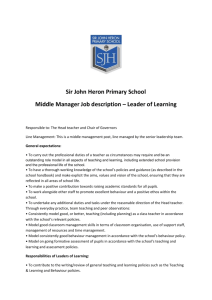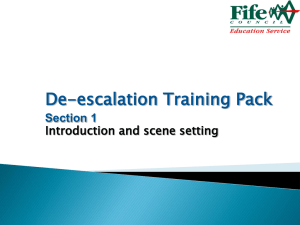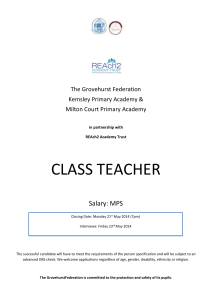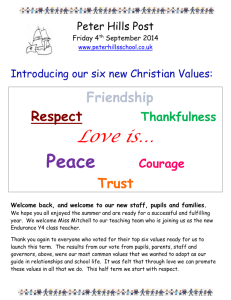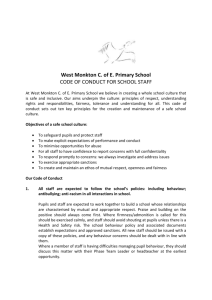positive behaviour policy
advertisement
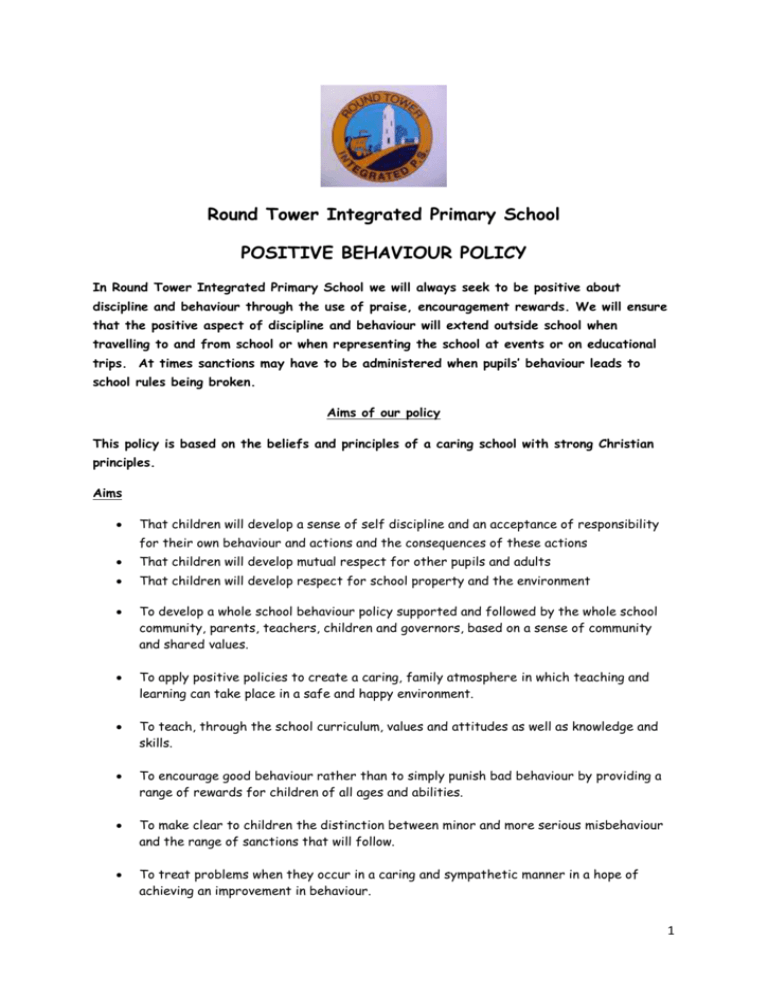
Round Tower Integrated Primary School POSITIVE BEHAVIOUR POLICY In Round Tower Integrated Primary School we will always seek to be positive about discipline and behaviour through the use of praise, encouragement rewards. We will ensure that the positive aspect of discipline and behaviour will extend outside school when travelling to and from school or when representing the school at events or on educational trips. At times sanctions may have to be administered when pupils’ behaviour leads to school rules being broken. Aims of our policy This policy is based on the beliefs and principles of a caring school with strong Christian principles. Aims That children will develop a sense of self discipline and an acceptance of responsibility for their own behaviour and actions and the consequences of these actions That children will develop mutual respect for other pupils and adults That children will develop respect for school property and the environment To develop a whole school behaviour policy supported and followed by the whole school community, parents, teachers, children and governors, based on a sense of community and shared values. To apply positive policies to create a caring, family atmosphere in which teaching and learning can take place in a safe and happy environment. To teach, through the school curriculum, values and attitudes as well as knowledge and skills. To encourage good behaviour rather than to simply punish bad behaviour by providing a range of rewards for children of all ages and abilities. To make clear to children the distinction between minor and more serious misbehaviour and the range of sanctions that will follow. To treat problems when they occur in a caring and sympathetic manner in a hope of achieving an improvement in behaviour. 1 These aims will be put into practice through instilling in pupils the importance of: a) Pride in themselves, their school and the environment b) Respect for school rules c) Respect for and wearing of the school uniform d) Honesty and truthfulness e) Tolerance f) Courtesy g) Consideration h) Self control i) Self discipline j) Self esteem Pupils will be reminded of the need for rules on a regular basis and in certain contexts or as part of information and education, e.g. in class, through lessons such as PDMU, RE, class assemblies, in the playground or moving between classes. Everyone working with children will have a clear understanding of how rules are applied. Consistent application of rules will be expected from: Senior Management Team All teaching staff, including any substitute teachers All classroom assistants Supervisory assistants School secretary Caretaking staff Any other adult working in the school Due to any changing circumstances, other rules may be introduced at the discretion of management in the school and for the safety of the pupils. POSITIVE DISCIPLINE Emphasis is on the positive approach of using praise and encouragement. The school will create an environment that enables all children to learn and develop to their full potential. Rewards will be given for: Good behaviour Improved behaviour Being helpful Self management Good attitude to work Exceptional behaviour and attitude Good or improved work 2 Rewards may include: Non verbal praise e.g. a smile, a look of approval Verbal praise Giving stickers, stamps, certificates Awarding small prizes Displaying work as a positive recognition of achievement Charts in classes to record achievement on an weekly basis Referral to another teacher or principal Nomination for the Super board Note to parents Star of the week Phone call to parent Role of parents It is imperative that parents support the school in maintaining the school rules. Parental influence is strong in a child’s life so parental acceptance of the school’s expectations and active cooperation with the staff is essential in order to help achieve high standards of discipline. Parents will be made aware of school expectations through having a copy of the school policy and through reminders in newsletters from school. Pupils’ Rights and Responsibilities Pupils in Round Tower IPS have the right to: Be taught in a pleasant, safe and ordered environment Have access to a well balanced, differentiated curriculum Be treated sensitively, consistently and with respect Be taught effectively according to their individual academic, social, physical cultural and emotional needs Have access to appropriate resources Clearly defined codes of conduct With rights come responsibilities and pupils must: Obey school rules Participate as fully as possible in the curricular and extra curricular activities and work to the best of their abilities Treat other people, their property and school building with respect Complete homework activities 3 Play their part in being punctual and attending school regularly with appropriate equipment Support the integrated ethos of the school Teachers’ Rights and Responsibilities Rights To teach in a safe, pleasant environment without disruption Be treated with respect by pupils, parents and colleagues Be given access to personal and professional development Have fair access to appropriate resources Receive professional support from Senior Management, Board of Governors, Education Board and other outside agencies Have a workload that is achievable in terms of time and resources available and for which there is appropriate remuneration To feel valued Responsibilities Provide an interesting and stimulating environment for learning with the framework of the N I Curriculum Monitor each child’s progress and keep parents appropriately informed of progress Encourage each child to achieve its potential Be punctual, well prepared and enthusiastic Treat everyone fairly and with respect Accept opportunities to enhance professional development Undertake a fair workload in the life of the school Be aware of resources available and how to use them Provide support for colleagues and be prepared to accept support from colleagues Support the integrated ethos of the school Parents’ Rights and Responsibilities Rights To expect their children to receive an appropriate education using suitable resources Be provided with information about progress, behaviour and policies To expect that their child will be safe and secure To have reasonable access to staff, confidentiality and to be listened to with respect To have access to conciliation if there is a problem To be a partner in the school e.g. invited to school functions To feel welcome in school To withdraw children from RE and assembly or certain cultural activities To attend Annual Parents’ meetings and have representation on Board of Governors 4 Responsibilities To ensure children have maximum possible attendance To ensure children are sent to school on time and are collected punctually To ensure their children are adequately prepared physically, emotionally, socially and intellectually To ensure that children are provided with necessary equipment To inform school of any factors that may affect their child’s progress or well-being To meet with teachers when necessary and by appointment when possible To follow agreed grievance procedures To be familiar with and support school policies and procedures Support the integrated ethos of the school SCHOOL RULES Safety Children should line up in an orderly manner when coming in for class after break, lunch or any outside class activity. While travelling on bus whether coming to or from school, the bus driver must be obeyed at all times. There must be no boisterous behaviour on the bus. All children must remain seated and use the seat belts. No child may leave school premises for any purpose during the school day without permission of their class teacher or Principal and a letter from parent or guardian. There should be no boisterous behaviour inside school. Children are expected to behave appropriately, under an adult’s direction. Use of buildings and school grounds Children should walk in an orderly manner on the left inside the school building All litter must be put into bins Toilets must be used appropriately Chewing gum is strictly forbidden Children must stay off the grass when it is wet or when directed to do so by an adult Courtesy and respect Children must not use foul or abusive language Words such as thank you, please and excuse me should be used 5 Children must learn not to interrupt adults Children should knock before entering a room Children must obey adults at all times Children should only take or use what is theirs or when permission has been given No toys (except at teacher’s discretion) games or electronic devices are to be brought to school No mobile phones are permitted in school No child is to hurt anyone else Children hurt by another child should not hit back, but should inform an adult immediately SANCTIONS Even with good classroom management, it may be necessary to have sanctions. These are for two main reasons: To make a child aware of disapproval of their unacceptable behaviour To protect the authority of adults in the school Sanctions should be: constructive applied with sensitivity be related to the misdemeanour where possible be specific to the culprit. 6 BEHAVIOUR TYPE SANCTION Minor disruptions e.g. Talking A stern look/warning Not listening Use of child’s name and reminder of rule Fiddling instead of listening Move to a different seat or adult stand Making noises Annoying others Being bold/poor attitude to other pupils Disobeying school rules beside child Loss of Golden Time Use of Red Spot Take 5 time in playground Not lining up appropriately Incomplete homework Running in school Out of bounds in playground Telling lies Getting up from chair when pupil should be working seated More significant disruption Throwing things Loss of Golden Time Persistently getting up from chair when Time out with parents informed should be working Persistent minor disruptions Moderately serious behaviour Deliberately hurting or insulting others Offensive gestures Break or lunchtime time out Spitting Parents informed of incident and form Arguing back Destroying own or others’ work Regularly not doing homework completed Referral to member of Senior Management Team for appropriate sanction Decide if more formal intervention is 7 Regularly not listening/paying attention needed Regularly distracting others Arrangements made for undone homework Disobeying an adult to do it in own time: parent informed Very serious behaviour Regular and consistent disregard for rules Referral to Principal Deliberately telling lies Loss of privileges e.g. trips, Golden Time, Stealing Rudeness to adults Sectarian or racist language Hurting others either physically or mentally Persistently swearing Clubs Detention Put on report card Suspension/expulsion Referral to ES or Individual Education Plan stage 1 or 2 Running out of school Deliberate damage to school or others’ property Deliberate lateness Drugs or solvent abuse Sexual references Classroom assistants and supervisory assistants can deal with minor happenings but should inform the class teachers Teachers will deal with situations on a daily basis If behaviour is extreme or persistent the teacher will make notes and inform a member of the Senior Management Team Parents may be told at any of the above stages of problems and will be told if a serious incident occurs 8 All staff should consider themselves responsible at all times for the behaviour of pupils within sight and sound. Responsibility for the behaviour of pupils is a collective responsibility. In all matters relating to the maintenance of discipline and the application of sanctions, it must be remembered that the aim of Round Tower Integrated Primary School is to develop selfdiscipline in our pupils and to build and maintain their self-esteem. 9
